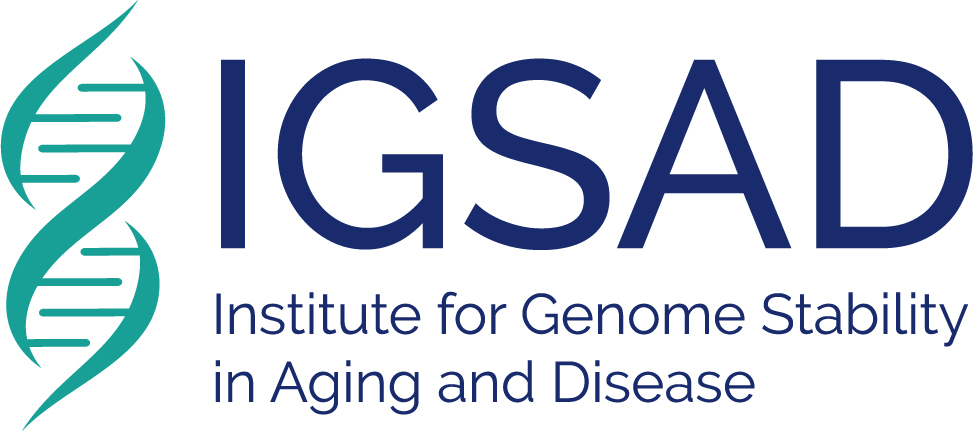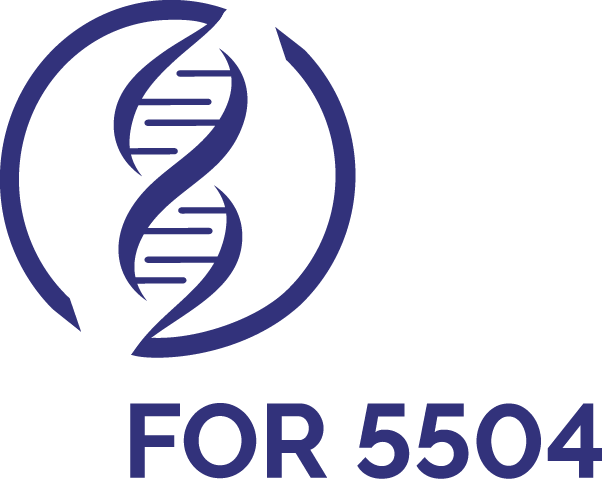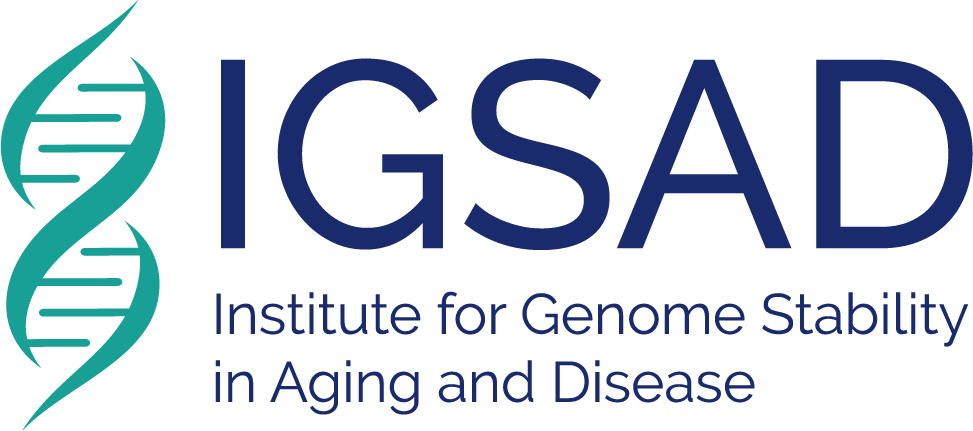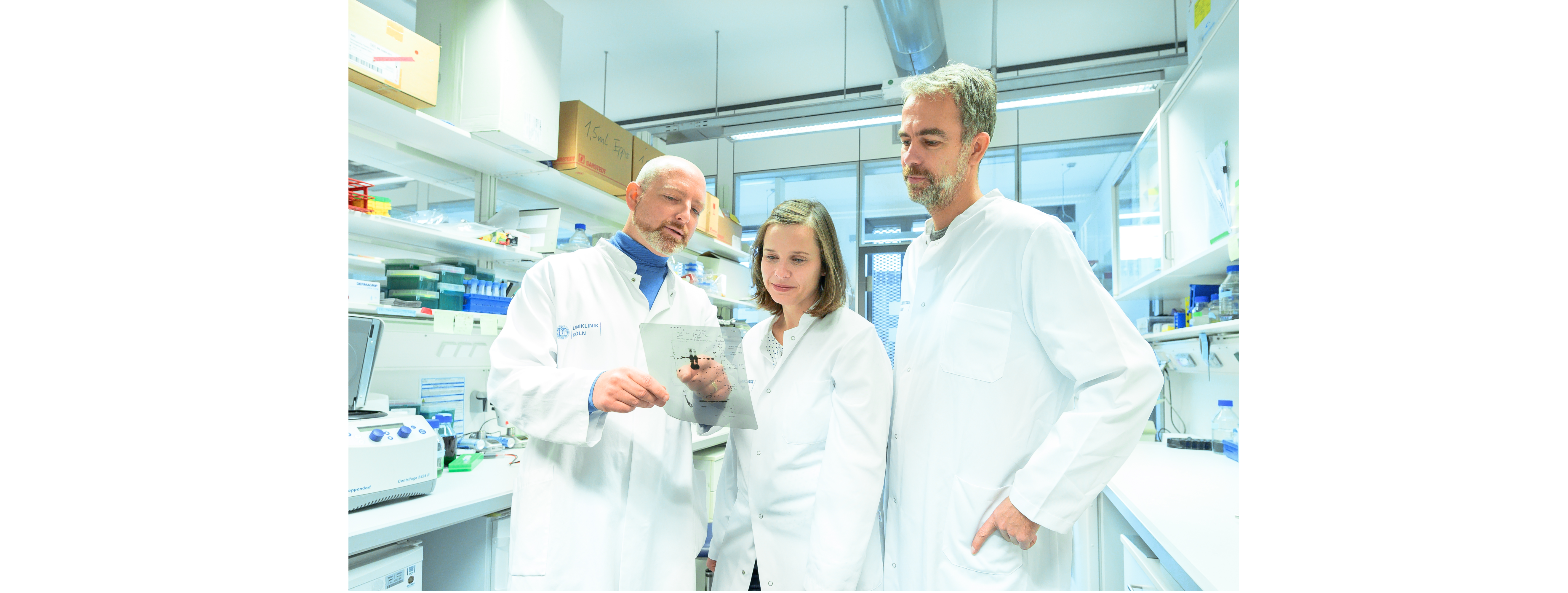The Institute
 The Institute for Genome Stability in Aging and Disease (IGSAD) is devoted to investigating the molecular mechanism of aging and chronic diseases. Aging is strongly correlated with a host of human pathologies, most prominently with cancer, inflammatory, cardiovascular and neurodegenerative diseases such as Alzheimer's and Parkinson's, as well as general functional decline. It is, therefore, of outstanding interest to further our understanding of the mechanisms underlying human aging and disease. DNA damage has been shown to play a central role both in cancer and, more recently, in aging. DNA damage can lead to genetic aberrations such as mutations that fuel cancer development. DNA damage can also interfere with transcription and replication leading to cell death, cellular senescence, and decline of cellular functionality. Consequently, stem cell compartments are deprived and differentiated cells degenerate. To protect from these outcomes, eukaryotes have evolved the DNA damage response, a complex network of signaling and repair mechanisms. The DNA damage response spans across all cellular compartments ranging from epigenetic alterations to the disruption of metabolism and proteostasis, mitochondrial dysfunction and inflammation. The IGSAD aims to unravel the molecular mechanism through which DNA damage promotes the aging process, causes cancer and age-related diseases. IGSAD scientists investigate DNA repair mechanisms that maintain the stability of the genome and how genome structure is maintained. We are using the genetic model organism Saccharomyces cerevisiae and Caenorhabditis elegans, mammalian disease models and human tissue cultures. IGSAD groups are associated with the CECAD excellence cluster of aging research, the University Hospital of Cologne, the Max Planck Institute for the Biology of Aging, and the German Aerospace Center (DLR).
The Institute for Genome Stability in Aging and Disease (IGSAD) is devoted to investigating the molecular mechanism of aging and chronic diseases. Aging is strongly correlated with a host of human pathologies, most prominently with cancer, inflammatory, cardiovascular and neurodegenerative diseases such as Alzheimer's and Parkinson's, as well as general functional decline. It is, therefore, of outstanding interest to further our understanding of the mechanisms underlying human aging and disease. DNA damage has been shown to play a central role both in cancer and, more recently, in aging. DNA damage can lead to genetic aberrations such as mutations that fuel cancer development. DNA damage can also interfere with transcription and replication leading to cell death, cellular senescence, and decline of cellular functionality. Consequently, stem cell compartments are deprived and differentiated cells degenerate. To protect from these outcomes, eukaryotes have evolved the DNA damage response, a complex network of signaling and repair mechanisms. The DNA damage response spans across all cellular compartments ranging from epigenetic alterations to the disruption of metabolism and proteostasis, mitochondrial dysfunction and inflammation. The IGSAD aims to unravel the molecular mechanism through which DNA damage promotes the aging process, causes cancer and age-related diseases. IGSAD scientists investigate DNA repair mechanisms that maintain the stability of the genome and how genome structure is maintained. We are using the genetic model organism Saccharomyces cerevisiae and Caenorhabditis elegans, mammalian disease models and human tissue cultures. IGSAD groups are associated with the CECAD excellence cluster of aging research, the University Hospital of Cologne, the Max Planck Institute for the Biology of Aging, and the German Aerospace Center (DLR).

Physiological Causes and Consequences of Genome Instability
9 PhD positions available in the Research unit on Physiological causes and consequences of genome instability
Summary: The newly established Research Unit 5504 funded by the German Research Foundation, DFG, is pursuing a highly innovative program that aims to understand the physiological causes and consequences of genome instability. The ultimate goal of the Research Unit is to understand both how homeostatic processes affect genome stability and how the DNA damage response maintains the physiological integrity of the organism in the face of DNA damage. We assembled a team of leading researchers that all focus on in vivo studies of genome stability using animal models. The research unit will bridge the knowledge gap between causes of genome instability such as transcription-blocking lesions, DNA strand breaks, telomere dysfunction, mechanical stress and structural elements such as G-quadruplexes, and the response mechanisms that determine how genome instability affects cellular and organismal homeostasis.
Principal investigators with PhD Projects:
Robert Hänsel-Hertsch: Epigenetic determinants of genome stability for mammalian tissue homeostasis https://www.haensel-hertsch-lab.cmmc-uni-koeln.de
Sara Wickström and Björn Schumacher: Mechanical-stress induced DNA damage and genome mechanoprotection in cellular and organismal homeostasis https://www.mpi-muenster.mpg.de/660820/wickstrom
Björn Schumacher and Siyao Wang: Epigenetic regulation of the cellular homeostasis amid transcription-blocking DNA damage during development and aging https://igsad.de/wang-pi.html, https://igsad.de/schumacher-pi.html
Ron Jachimowicz: Ubiquilins in DNA repair and neurodegeneration https://www.age.mpg.de/science/research-laboratories/jachimowicz
Stephanie Panier: Mechanism and consequences of SLX4IP- and ERCC1-XPF-dependent telomere dysfunction https://www.age.mpg.de/science/research-laboratories/panier, https://igsad.de/panier-pi.html
Thomas Benzing and Bernhard Schermer: Metabolic deregulation, genome instability, and the progression of chronic kidney disease https://www.kidneyresearchcenter.org
Location: The University and University hospital of Cologne, and the Max Planck Institutes for the Biology of Ageing in Cologne and for Molecular Biomedicine in Münster are located in major urban centers with a vibrant academic environment.
Qualification: Applicants should have a Master‘s degree and a solid background in molecular biology, cell biology, genetics, biochemistry, or bioinformatics.
How to Apply: Please send 1. CV, 2. letter of intent, 3. list of publications, 4. names and addresses of three references to schumacher-office[at]uni-koeln.de


